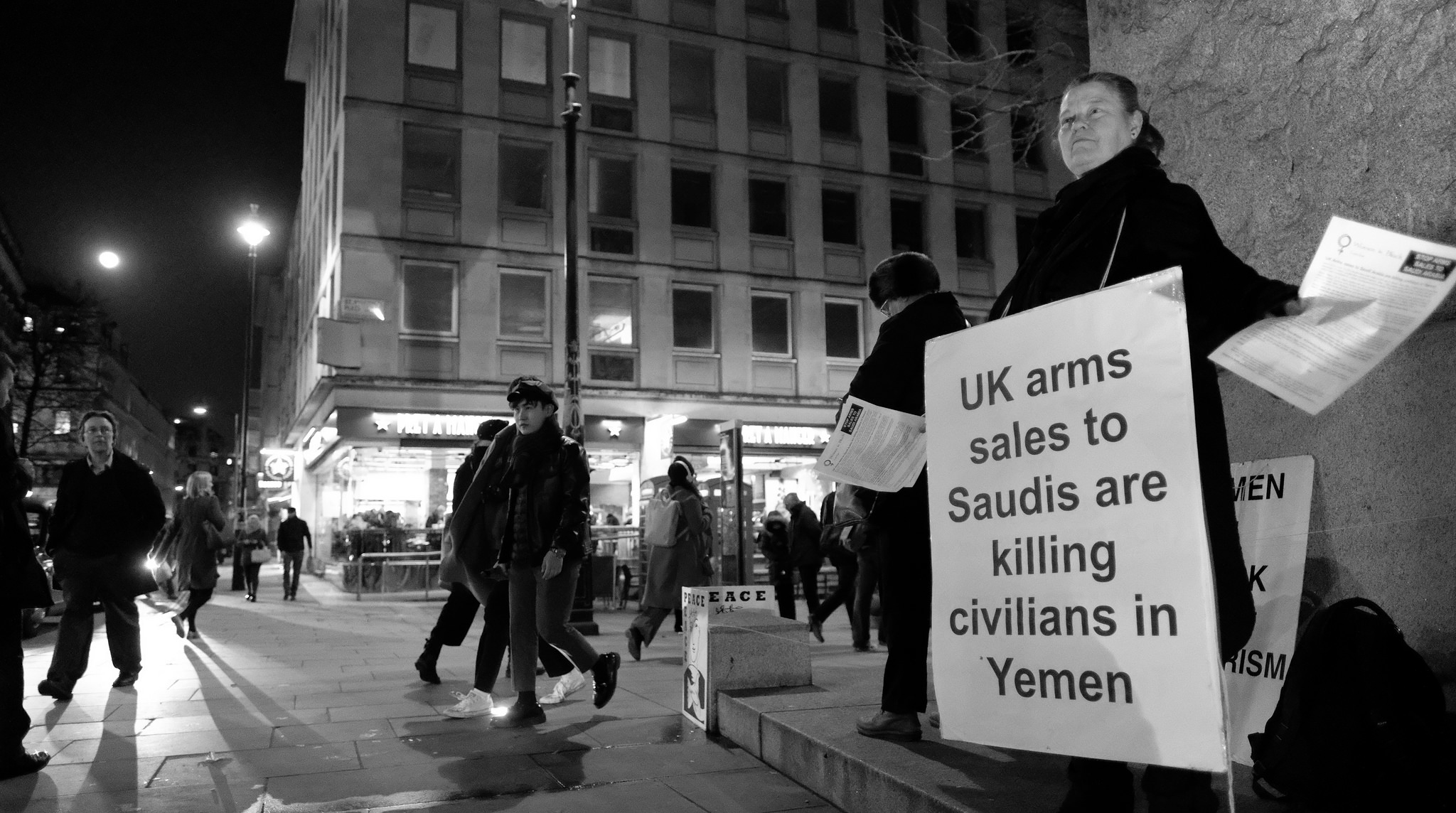The idea that Westminster is the "mother of all parliaments," representing a democratic model for the world, is a cultivated myth, writes Mark Curtis.
By Mark Curtis | March 29, 2019
British Foreign Policy Declassified
Member of Women in Black, a global movement against militarism, Jan. 31, 2018, Central London. (Alisdare Hickson via Flickr)
On Tuesday in the British parliament, Labour's shadow foreign secretary Emily Thornberry asked an urgent question relating to allegations that British troops have been covertly fighting in Yemen and supporting the Saudi-led coalition.
As reported in the Mail on Sunday, five British special forces troops from the elite Special Boat Service (SBS) were injured while "advising" Saudi Arabia on their deadly campaign in Yemen.
The commandos were injured in gun fights as part of a top-secret campaign, and other reports have claimed British troops have been killed in such battles. British soldiers from the Special Air Service (SAS) have reportedly been secretly deployed and operate "dressed in Arab clothing."
Responding to Labour’s questions, Mark Field, a minister in the U.K.'s foreign office, said that he would seek to get to the bottom of these "very serious and well sourced" allegations.
The presence of British soldiers in Yemen, secretly fighting a war that has brought death, famine and destruction to millions of innocent civilians, raises an age-old question: why does British foreign policy in the Middle East support dictatorships, abuse human rights and prioritize Britain’s power status?
It’s tempting to say the reasons are simply geopolitics, oil and other commercial interests. But there is a deeper explanation: Britain, far from being a true democracy, is in reality an oligarchy that promotes the interests of a privileged domestic elite. The idea that Westminster is the "mother of all parliaments," representing a democratic model for the world, is a cultivated myth.
An Elite Few
The U.K. has elections every five years, an independent judiciary, freedom of speech and association, and strong laws protecting the equality of all citizens and civil liberties. Yet real power rests in the hands of an elite few who control policy-making institutions and the dominant ideas in society.
British foreign policy-making is so centralized that it is akin to an authoritarian regime. A prime minister can send troops into action without even consulting parliament.
Britain is currently fighting several covert wars with no parliamentary authorization or debate. Away from Yemen, special forces are operating on the ground in Syria, despite parliament only having approved air strikes against the Islamic State (IS) group. The British covert war in Syria has been going on since 2011, with almost no discussion by elected MPs.
In 1976, Lord Hailsham famously termed the U.K. an "elective dictatorship" because parliament is easily dominated by the government of the day and faces few constraints on its power. But this was before former prime minister Margaret Thatcher centralized decision-making still further, regularly bypassing the cabinet and relying on a small set of advisers – a strategy continued by Tony Blair, leading to the disastrous invasion of Iraq.
While the government is saying it will look into the role the British military is playing in Yemen, the stock response to parliamentary questions on U.K. covert action tends to be: "For reasons of national security, it is the longstanding policy of successive British governments not to comment on intelligence and sensitive operations."
Even minor information is withheld on "sensitive" subjects: when MP Alex Sobel asked the government last month how much the U.S. reimburses Britain for the costs of the defense ministry police at the spy base at Menwith Hill in Yorkshire, a government minister refused to say.
Please go to Consortium News to read the entire article.

No comments:
Post a Comment
Note: Only a member of this blog may post a comment.